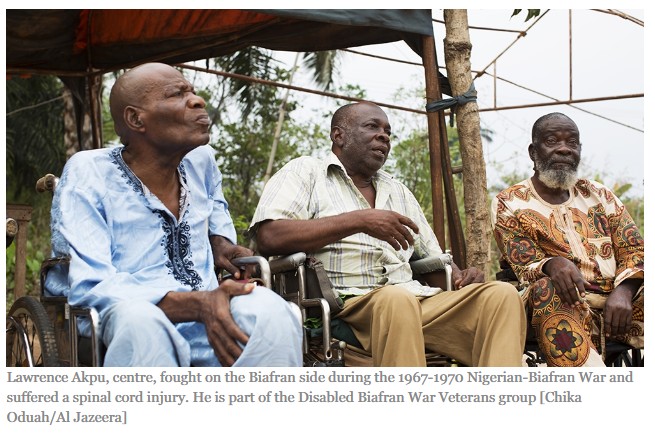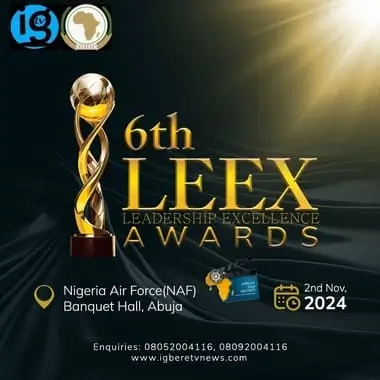address at the United States Institute of Peace, Buhari responded to a participant in the audience who asked how he would bring development to the oil-rich Niger Delta region in the south, which has suffered decades of environmental degradation due to oil spills and oil bunkering.
“I hope you have a copy of the election results,” Buhari responded to the woman. “Naturally, the constituencies that gave me 97 percent cannot, in all honesty, be treated [in the same way] on some issues with constituencies that gave me five percent. I think this is a political reality.”
Buhari’s soundbite has been tagged and re-posted across Nigeria’s social media spaces.
“To be honest, things like the president’s 97 percent and five percent comment only helped add further fuel to the fire that the southeast is being marginalised,” Nwanze says.
And that fire is already burning in the southeast. On storefronts along the streets of Umuahia, photos of Nnamdi Kanu and Odumegwu Chukwuemeka Ojukwu, the leader of the short-lived Republic of Biafra (1967-1970) are pasted on wooden doorframes.
At the campus of Amah’s university, more students are reading pro-Biafran books and followers of Kanu hold “evangelism” meetings to preach the gospel of pro-Biafra.
At crowded bus stations in town, Kanu’s voice booms from loudspeakers. Many people here mark May 30 as Biafra Remembrance Day.

A bloody past
Kanu and leaders of other pro-Biafra groups have called for supporters to stay at home on May 30 to remember those who died during the 1967-1970 Nigerian-Biafran War.
This May 30 will mark 50 years since the 1967 declaration of the Republic of Biafra, by the late Ojukwu.
The declaration of the establishment of the Biafra nation, carved out of southeastern Nigeria, came after failed attempts by the Nigerian government to address the grievances expressed by southeastern Nigerians. In 1966, thousands (PDF) of Igbo civilians were killed, mainly in northern Nigeria.
The 1966 killings began after a group of young army officers – some of whom were Igbo Christians -overthrew Nigeria’s democratic government and assassinated several people, including the prime minister and other Muslim northern leaders.
“They came with every dangerous thing, some with arrow, some with gun, some with cutlasses, some with iron. So anything they could handle, they handled it and began to kill Igbo people,” says Lawrence Akpu, recalling the day in 1966 when he was in a market in a town in northern Nigeria where he lived with fellow Igbos. “Everybody started running up and down and from there, we left everything we had.”
Akpu joined the mass exodus of Igbo people from northern Nigeria to their ancestral homeland in the southeast.
When the war started, he joined a Biafran brigade to fight Nigerian soldiers. He says he fought wearing rubber sandals and t-shirts with holes in them. During a heavy wave of shelling, a piece of shrapnel cut into his spinal cord. Today, he’s in a wheelchair.
Three years of war left southeastern Nigeria in ruins. Estimates of the death toll range from one million to six million. After the Nigerian federal military government – supported by the UK – imposed blockades that made it difficult for aid groups to deliver food and relief supplies to Biafra, many children died of kwashiorkor, a severe form of malnutrition characterised by a distended abdomen.
Igwe Christopher Ejiofor, aide-de-camp to Ojukwu throughout the war, remembers carrying nearly dead children as he helped to manage relief services.
“I can’t count the number of people I picked [up] who were at the point of starvation and death,” he says. “And every time I took them to the hospital, they died and I [would go] back the next day [with more children].” Igwe Ejiofor is the traditional ruler of his community in the southeastern state of Enugu.
When images of Biafran children flooded Western media, the world began to pay attention. Beatles singer-songwriter John Lennon returned his MBE order in protest at the UK’s involvement in the Nigerian-Biafran War. Writer Kurt Vonnegut travelled to Biafra and wrote about the war. Steve Jobs, according to Walter Isaacson’s 2011 biography of the Apple co-founder, began to question his beliefs about God after he saw a picture of two skeletal Biafran children on the infamous July 12, 1968 cover of Life magazine. In the







